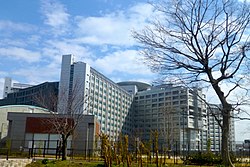
Within the criminal justice system of Japan, there exist three basic features that characterize its operations. First, the institutions—police, government prosecutors' offices, courts, and correctional organs—maintain close and cooperative relations with each other, consulting frequently on how best to accomplish the shared goals of limiting and controlling crime. Second, citizens are encouraged to assist in maintaining public order, and they participate extensively in crime prevention campaigns, apprehension of suspects, and offender rehabilitation programs. Finally, officials who administer criminal justice are allowed considerable discretion in dealing with offenders.
In 2021, the Japanese police recorded 568,104 crimes, of which 8,821 were cases of murder, robbery, arson, rape, sexual assault, indecent assault, kidnapping, and human trafficking, which are designated as major crimes (jūyō hanzai, 重要犯罪) by the National Police Agency. The arrest rate, which indicates the percentage of unsolved crimes recognized by the Japanese police by 2021 for which the perpetrators were arrested in 2021, was 46.6%. Of these, the arrest rate for cases involving murder, robbery, arson, rape, sexual assault, indecent assault, kidnapping, and human trafficking, which are designated as major crimes, was 93.4%.[1]
As of 2001, Japan has a conviction rate of over 99.8%, even higher than contemporary authoritarian regimes.[2] Scholars say the biggest reason for Japan's very high conviction rate is the country's low prosecution rate and the way Japan calculates its conviction rate is different from other countries.[3][4][5][6] According to them, Japanese prosecutors only pursue cases that are likely to result in convictions, and not many others.[3][4][5][6] According to Professor Ryo Ogiso of Chuo University, prosecutors defer prosecution in 60% of the cases they receive, and conclude the remaining 30% or so of cases in summary trials. This summary trial is a trial procedure in which cases involving a fine of 1,000,000 yen or less are examined on the basis of documents submitted by the public prosecutor without a formal trial if there is no objection from the suspect. Only about 8% of cases are actually prosecuted, and this low prosecution rate is the reason for Japan's high conviction rate.[5][7][4] According to Keiichi Muraoka, a professor at Hakuoh University, the 60% suspension of prosecution in Japan is due to excessive fear that prosecutors will lose the case and ruin their reputation.[3]
After the lay judge system (saiban-in system, 裁判員制度) in which citizens participate, began in 2009, the prosecution and conviction rates have declined; in 2006, the prosecution rate for murder, including attempted murder, was 56.8%; as of 2017, the rate had dropped to 28.2%. The overall conviction rate in the first instance also dropped to 97.8% as of 2017.[8] Although the Ministry of Justice noted that the decline in the prosecution rate began before the introduction of the lay judge system, some lawyers and scholars have pointed out that the introduction of the lay judge system, in which citizens participate, has led to greater emphasis on direct evidence and testimony at trial and more cautious judgment on inferences. For example, according to Akira Sugeno, a lawyer who is a senior member of the Japan Federation of Bar Associations, a 2016 street crime in which three people were attacked with kitchen knives was charged with injury because there was no evidence of intent to kill, but before the system change it would have been charged as attempted murder because the judge's reasoning would likely have found intent to kill. They also pointed out that the reformed system has reduced lengthy interrogations and other forms of aggressive evidence-gathering, making it more difficult to create false convictions.[8]
- ^ 令和3年の刑法犯に関する統計資料 (PDF) (in Japanese). National Police Agency. August 2022. p. I, II, 2, 17. Archived from the original (PDF) on 19 December 2022. Retrieved 2 February 2023.
- ^ Ramseyer, Mark; Rasmusen, Eric (January 2001). "Why is the Japanese Conviction Rate so High?". The Journal of Legal Studies. 30 (1): 53–88. CiteSeerX 10.1.1.561.9973. doi:10.1086/468111. S2CID 55632179.
- ^ a b c "Order in the Court: Explaining Japan's 99.9% Conviction Rate". Nippon.com. 18 January 2019. Archived from the original on 12 July 2022.
- ^ a b c "Carlos Ghosn and Japan's '99% Conviction Rate'". The Diplomat. 31 March 2020. Archived from the original on 28 June 2022.
- ^ a b c ゴーン氏は去りぬ;刑事手続に関する比較法的考察 (in Japanese). Yomiuri Shimbun/Chuo online. Archived from the original on 18 July 2022.
- ^ a b Ramseyer, John; Rasmusen, Eric (12 July 1999). "Why Is the Japanese Conviction Rate So High?". EconPapers. Archived from the original on 7 November 2013.
- ^ 略式裁判について (in Japanese). Public Prosecutors Office. Archived from the original on 25 October 2022. Retrieved 29 January 2023.
- ^ a b 裁判員制度10年、殺人罪起訴率4割減 未遂含め「自白なし」慎重対処 (in Japanese). Nishinippon Shimbun. 17 May 2019. Archived from the original on 27 November 2022. Retrieved 2 January 2023.